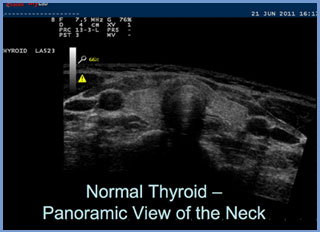|
|
 |
 |
 |
 |
 |
| |
Normal Thyroid |
|
 |
The endocrine system is made up of glands which regulate the function, growth and development of virtually every cell, tissue and organ in the body by secreting chemicals called hormones directly into the bloodstream. When endocrine disorders develop, too much or too little hormone is secreted by a specific gland because the gland stops functioning properly due to illness, surgical removal or natural causes.
Thyroid dysfunction occurs when the thyroid, a small, butterfly-shaped gland located at the base of your neck, produces either too much thyroid hormone, which causes your body's systems to speed up (hyperthyroidism), or too little thyroid hormone, which causes your body's systems to slow down (hypothyroidism). Both negatively affect your overall well-being.
Untreated thyroid disease may lead to elevated cholesterol levels and subsequent heart disease, as well as infertility and osteoporosis. Research also indicates a strong genetic link between thyroid disease and other autoimmune diseases, including certain types of diabetes, arthritis, and anemia. |
|
 |
Thyroid disorders affect an estimated 200 million people worldwide, and an estimated 27 million Americans. More than half remain undiagnosed. In fact, thyroid disease is more common than diabetes or heart disease.
|
|
|
 |
|
 |
|
|
|
 |
 |
MEDICAL DISCLAIMER: The information found on this website is for educational purposes only and is not providing medical or professional advice. It should not be used for diagnosing or treating a health problem or disease. It is not a substitute for professional medical care. If you have or suspect you might have any health problems, you should consult a physician. |
 |
 |
|
|
|